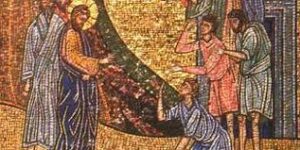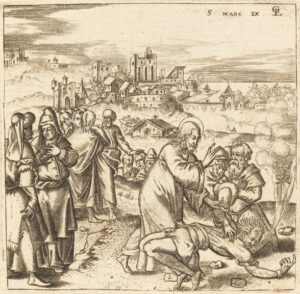The Gospel for the Fourth Sunday of Great Lent: Mark 9:17-31
At that time, a man came to Jesus kneeling and saying: “Teacher, I brought my son to you, for he has a dumb spirit; and wherever it seizes him it dashes him down; and he foams and grinds his teeth and becomes rigid; and I asked your disciples to cast it out, and they were not able.” And he answered them, “O faithless generation, how long am I to be with you? How long am I to bear with you? Bring him to me.” And they brought the boy to him; and when the spirit saw him, immediately it convulsed the boy, and he fell on the ground and rolled about, foaming at the mouth. And Jesus asked his father, “How long has he had this?” And he said, “From childhood. And it has often cast him into the fire and into the water, to destroy him; but if you can do anything, have pity on us and help us.” And Jesus said to him, “If you can! All things are possible to him who believes.” Immediately the father of the child cried out and said, “I believe; help my unbelief!” And when Jesus saw that a crowd came running together, he rebuked the unclean spirit, saying to it, “You dumb and deaf spirit, I command you, come out of him, and never enter him again.” And after crying out and convulsing him terribly, it came out, and the boy was like a corpse; so that most of them said, “He is dead.” But Jesus took him by the hand and lifted him up, and he arose. And when he had entered the house, his disciples asked him privately, “Why could we not cast it out?” And he said to them, “This kind cannot be driven out by anything but prayer and fasting.” They went on from there and passed through Galilee. And he would not have any one know it; for he was teaching his disciples, saying to them, “The Son of man will be delivered into the hands of men, and they will kill him; and when he is killed, after three days he will rise.

Every time I hear or read this Gospel story, my mind goes immediately to the words of the father of the epileptic boy: “Lord, I believe. Help my unbelief.”
That, however, was not the chief reason the Father’s chose this reading for this Sunday. The chief reasons, actually, and all three deserve comment before we move on to the subject at hand.
1 Christ predicts His death and Resurrection

We are getting near to Holy Week, and the Lord again tells His disciples He will be killed, then rise again. In Mark, this was the second time He had told them (See Mark 8:31-33). There would be a third time to come, which we hear next Sunday in Mark 10:32-34.
I do wish the Fathers who established our Lectionary * had gone on to include Verse 9:32: “But they did not understand what He meant and were afraid to ask Him about it.”
- which, I understand, goes back at least to the Fourth Century.
Mark wrote this long after the Resurrection, as the Apostles looked back at how utterly stone-deaf they had been. Why couldn’t they have heard what He was saying?
It was because it was utterly inconceivable to them that the Messiah should die. They believed Jesus was the Messiah, the Son of God, sent by God to triumph, to bring in God’s Kingdom, perhaps to restore the Jewish Nation. But to die? It would be as if a candidate for President of the United States announced he was running on the platform of letting the other party shoot him dead in public, and then after that he’d be inaugurated in January. No one would take that seriously. He spoke often in symbols, even riddles. Surely He was doing it again.
But why were they afraid to ask Him what He meant? Because they were afraid of His answer. They loved this Man Who had shared His life with them – but for such a short time, only three years. They couldn’t, they wouldn’t believe that He really was going to die. They couldn’t face it, couldn’t bear it. Better not to ask, not to know.
2 Christ’s Humanity

I think another reason the Fathers chose this passage was because it shows so clearly that our Lord Jesus was no impassible God, striding the planet but never really part of it. He was a Man. In this story Jesus (forgive me) “loses His cool”, in such a human way..
He had been training and instructing His Apostles so they will know how to manage the Church without His physical presence. “My time is nearly at hand, and they can’t heal this boy. They still are not ready.” And Jesus, in utter frustration, exasperation, cries: “O faithless generation, how long am I to be with you? How long am I to bear with you? Bring him to me.” He sounds like any of us when things are going terribly wrong.
3 The Sources of Spiritual Power
Yet another reason: Near the end of this passage Christ tells us the things we should be concentrating on during Lent, the two keys to spiritual growth. After He had healed the boy and calmed down, the Apostles went to Him asking: “Why could we not do it?” [I paraphrase and interpret here]: “It seemed so simple when You did it. You just told the demon to leave the boy, and it did! We tried that and it didn’t work. What did we do wrong?”

Then Jesus taught them the keys to spiritual power, or rather of “tapping in” to God’s power: “This kind cannot be driven out by anything but prayer and fasting.” It sounds like He was referring to a particular kind of demon which he knew personally! However, I think there is a broader application: If you want to get rid of your “demons”, the unholy temptations that come after you again and again *, here’s what to do: pray and fast. And if that doesn’t work, call on Jesus to help you. And then pray and fast some more.
- The Orthodox Church calls these “passions”. The Roman Catholic Church calls them “besetting sins”.
Now to today’s chief topic:
The father’s cry: “Lord, I believe. Help my unbelief.”
In my long life I’ve known only one person who says he has never had doubts about the Faith. I believe him. Everything in his life indicates the authenticity, sincerity and solidity of his faith. God bless Him. I would envy him if envy weren’t a deadly sin.
If you are like him, if you have no doubts, God bless you, too. Probably you should not read the rest of this Post.
Doubt
Here is my amateur analysis of doubt. I believe there are three kinds of doubt:
1 Intellectual doubt, which comes from looking seriously at the evidence – for God, for the Incarnation of God in Jesus Christ – and not being unconvinced.
2 There is emotional doubt. A person can be convinced of the Faith, yet somehow it feels like it’s not true.
3 There is… I don’t have a good word for this, or perhaps I don’t quite understand it, or perhaps it’s just that it can’t be described in words. What I mean is when people have doubt in what we Orthodox call the “heart”, in the soul, in the deepest innermost part of their being, they are unsure, they doubt the Lord or the Faith.
The closest natural “soul knowledge” that I know (because I’ve experienced it myself) is when a man and woman just know deep within them that they are meant for each other. Or alternately, they may seem right for each other intellectually and emotionally, but something within them says this is just not right. This is hard to describe in words because we can never see into peoples’ souls – except into our own souls, and that not always.
In all three cases, I don’t mean complete disbelief, only doubt.
Now, different people suffer from different kinds of doubt. For one example, I’ve known people who believed emotionally but not intellectually. Some were afraid to think about the Faith for fear they’d find it untrue.
A Case History
It will be helpful to take an actual “case”. Let’s take an easy case: me. I don’t like to make Posts focus on me, but I think it’s the way to go this time, because I’m the only person I know from the inside.
The reason my attention goes immediately to the father’s words is that they are my words, too.
“Lord, I believe”. Really I do.

I am intellectually convinced that God exists and that Jesus Christ is the Son of God and the Church is the Body of Christ. And when my soul is most open to God, when I am at Divine Liturgy, I am sure I believe. I say the Creed and receive the Holy Eucharist with my whole heart. Also I know what Jesus and Saint Nicholas and Saint Nektarioss have done for me. And I know that when I have tried to make the Lord’s teachings the key to my living, I have seen how they have “worked”, how they saved me from doing many stupid things. I believe.
Yet I suffer from doubt, emotional doubt. After all these decades, there are still times when it just comes over me without warning: “It’s crazy to have built my life around this one Man, out of all the billions of people who have lived.” Sometimes after funerals, especially of people I’ve loved so much (and, being a pastor, there have been many), it comes over me: “God, if You love us, why do You leave us to die?” (I know the correct theological answers to that, but my emotions won’t accept it.) I watch the news and wonder: “How could a good God give us a world like this one?” And sometimes it’s “I believe in Jesus Christ. I really do. But what if I’m wrong about Him?”
Do I believe these doubts? No. But sometimes it feels like I don’t believe. “Lord, I believe; help my unbelief.”
I thought I would feel less doubt as I got older. I thought I would feel the Presence of God ever more, especially as I near the end of my life on earth. It has not been like that at all. I’m hoping (I think maybe I wrote this before, some years ago) that it will be like when my wife and I driving in Oregon. It was October and already the winter clouds and gloom had moved in. We so badly wanted to see Mount Hood, and to our amazement as we drew near it cleared up. Dianna wanted to take a picture, and I said: No, no, it will be better as we come closer. Well, it wasn’t. For a long way as we came closer the forest enveloped the scene, until suddenly we made a turn and…

Will it be like that? Like this? Like doubting Thomas when He first saw His Risen Lord and after that He could never doubt again. Oh, I hope so.
How do we rid ourselves of our doubts?
Let me tell you how I do it. When my emotions cause me to doubt, I do several things. (Whether I’m doing this “right” I don’t know. All I know is this works for me.)
1 I quickly tell the devil to “go to hell”. I know I believe, and I consider my doubts to be the work of the Evil One.
2 I go back and think through the Faith: why I believe in God, in Jesus Christ, in the Church, in the Holy Scriptures, the Saints. This sounds like it would take a long time, but it does not: only a few minutes. I’ve had to do this so often that I have my arguments “down pat”.
3 I think back to all God has done for me, and His saints and all the good loving Christian people I have known in my life, my heritage. How could I possibly deny that? dare to let them down?
4 As soon as I have time, I do some serious praying. I have an advantage: priests are supposed to be in church often. The Divine Liturgy, Vespers, Matins – these “glue me back together” again.
Now take a look at yourself.
Do you have doubts? Be honest. Then analyze: ln what way do you doubt? in your intellect? your emotions? or does it go deep into soul? .
What can you do to deal with your “unbelief”? I’m just giving some amateur advice here. Whose doubts do I really know except my own? and that not very well. The first thing to do is what I do: Tell Satan to go to hell where he belongs and leave you alone. Tell him. Say it.
If your doubts are in your mind, your intellect, then take some time to study, learn, read, listen. Don’t be afraid. Our Faith is not built on shadows. Some of the most brilliant and best people in history were and are Christians, Orthodox Christians. If you haven’t time to read, listen to some of the multitude of excellent Orthodox podcasts (I especially like Father Tom Hopko’s at Ancient Faith.) Watch genuine Orthodox YouTube. It’s so easy these days. * Do this, and I believe your present doubt will become the begetter of a deeper and more profound faith.
- A warning here: There are some “crazy Orthodox” online who are chiefly trying to stir up trouble. If you’re not sure, ask a priest or someone else you know and trust.
If your doubts are in your emotions, try what I do. See above.
What if your doubts are deep in your soul, but you really want to believe and you are convinced that the Orthodox Faith is true… I have not been in your condition, so I don’t know what you should do. But my guess would be you should pray more and go to Divine Liturgy regularly and throw yourself on the mercy of God. Only He can touch your heart and soul (I can’t) and see what He can do for you.
In all cases, if we truly want to be healed in mind, emotion and soul, we need a Father Confessor or a spiritual father or mother -someone with whom you can share not only your sins but your difficulties, your “unfaith”. For myself, I have a spiritual mother to whom I have long turned for advice, for counsel. She would tell you (but she won’t) that I don’t always take her advice! but she helps me to steady myself when I’m shaky, to forgive when I don’t want to, and much more.
What have I missed here? Perhaps a lot. If you have suggestions for how to overcome doubt – perhaps from your own experience – why don’t you comment below?
“Lord, I believe.” Brother or sister, whoever you are, you already believe at some level, else you wouldn’t be spending time reading this poor Blog. God bless you.
And you know I believe, despite my unbelief, else I wouldn’t be spending time writing this Blog!
Therefore: “Lord, help our unbelief.”
Next Week: One of my favorite stories – Saint Mary of Egypt
The following Friday we begin our usual twice-daily Holy Week Posts.